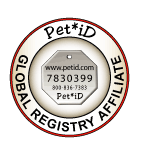Let’s assume that you’ve lost your pet — he or she got loose, ran away, didn’t come home. What are you going to do now? I’ve written this article to share my years of experience dealing with hundreds of owners with lost (or found) pets. There are a number of options you need to consider.
How are you going to find your lost pet? There are pros and cons to each of the tracking methods used in the US today as noted below in the Table. The information presented here is intended to help you decide what works best for you and for your pet. You need to give your pet the best chance of coming back home.
According to the American Kennel Club’s (AKC) Companion Animal Recovery (CAR) program, each year there are over 10 million pets who stray from their home — and that’s just in the United States. Only a small fraction of them are returned to their owners despite the best efforts of shelters, animal control officers and veterinarians. One-third of all pets go missing sometime during their lifetime. Without proper ID, 90% of these pets never return home, and 4 million of them are eventually euthanized because their owner cannot be found. Those are the sad statistics.
Table: Popular Pet Identification Methods

Is Microchipping the Best Solution?
Microchipping technologies have the potential to reunite millions of pets with their families, but the technology must be widely adopted and universally applicable to be a viable alternative. Unfortunately, a microchip made by one company often can’t be read by a scanner designed to read the microchip of another. There’s a lack of standardization. I have often seen that a veterinary clinic may not have the right scanner to detect and read the microchip that may have been implanted in a pet by an animal shelter that’s just down the street.
There are three major manufacturers of microchips using proprietory technology who are competing to control the market. In practice, my experience is that most AVID scanners read only FECAVA microchips and cannot read Trovan and ISO microchips. However, other types of scanners such as those from HomeAgain and WorldScan seem to be able to read all of the popular microchip formats. A pet owner in the US who has microchipped his pet needs to be lucky and hope that his runaway pet will be found by someone with the right type of scanner!
I don’t want to bad-mouth microchipping, however, because some day it will be standardized and used by almost everyone. The Coalition for Reuniting Pets and Families is asking that microchip and scanner manufacturers support the use of scanners that can read all microchips, and that such a scanner be made readily available to shelters, animal control officers and veterinarians throughout the country. Here’s a link to read more about this: click here .
Pet Registry Database
Getting your pet microchipped is not enough!! You need to register your pet’s chip number with a pet registry service. The microchip becomes your pet’s unique ID#. Enrolling your pet in a registry/recovery service with adequate coverage is essential so people will know how to contact you when your lost pet is found.
Unfortunately, a single, centralized lookup system and database for lost and found pets in the US does not yet exist. AAHA’s petmicrochiplookup.org is the most widely used database for microchip code lookup. This database includes; AKC CAR, HomeAgain, PetLink, ResQ, InfoPet, EIDAPinc, but does not (yet) include www.24petwatch.com and AVID PetTrac. In Europe, however, there is a central registry called europetnet.com, and elsewhere in the world the centralized registry is called PetMaxx.com.
So What Do I Do Now?
1. Decide which Pet Identification Method works best for you and for your pet.
2. Choose a Pet Registry Database.
If your pet is microchipped; we recommend using a pet registry database that’s included in petmicrochiplookup.org
– AKC CAR
– HomeAgain
– PetLink
– ResQ
– InfoPet
– EIDAPinc
If your pet is not mi crochipped; than you can register your pet using any registry (there are 100’s of them). We can recommend Pet*iD because they:
crochipped; than you can register your pet using any registry (there are 100’s of them). We can recommend Pet*iD because they:
– have been around since 1996,
– provide web-based tools for keeping your pet info up-to-date,
– keep track of physical tag numbers and microchip codes,
– guarantee that your contact information remains private and confidential,
– include pet photos, rabies vaccinations and other veterinary data related to public health,
– have the lowest registration fee,
– send you a durable (stainless steel) Pet*iD Identification Tag ,
You don’t have to wait for anything — sign up for Pet*iD right now (see below) if your pet isn’t already registered. Using our Pet*iD affiliate link at the bottom of this page also helps us maintain this website.

I would like to say thank you a lot for your job you have made in writing this article. I am hoping the same perfect job by you in the future too.
Thank you Rebecka,
Your comment means a lot to us. We take pride in our profession and are working hard to share our knowledge and recources with pet-owners and fellow pet-care providers.
Pamela Haffner, RVT